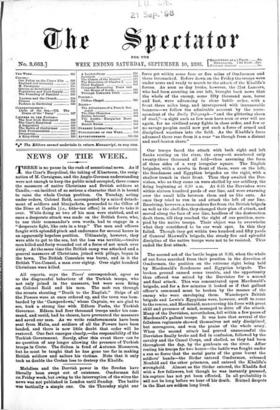Our troops faced the attack with both right and left
flanks resting on the river, the army—it numbered only twenty-three thousand all told—thus assuming the form of three sides of a very irregular square. The English brigades, with a zareba in front of them, were on the left; the Soudanese and Egyptian brigades on the right, with a shallow trench in their front. Thus they awaited the Der- vishes, who as they came on were shelled by our artillery, the firing beginning at 6.30 a.m. At 6.45 the Dervishes were within sixteen hundred yards of our line, and were swarming over the small hills between them and us like ants. At once they tried to run in and attack the left of our line. Receiving, however, a tremendous fire from the British brigade as well as the shell-fire, they changed their plan of attack, and moved along the face of our line, heedless of the destruction dealt them, till they reached the right of our position, occu- pied by the native troops. Their object was to overwhelm what they considered to be our weak spot. In this they failed. Though they got within two hundred and fifty yards of General Maxwell's brigade, the steady fire and splendid discipline of the native troops were not to be resisted. Thus ended the first attack.


































